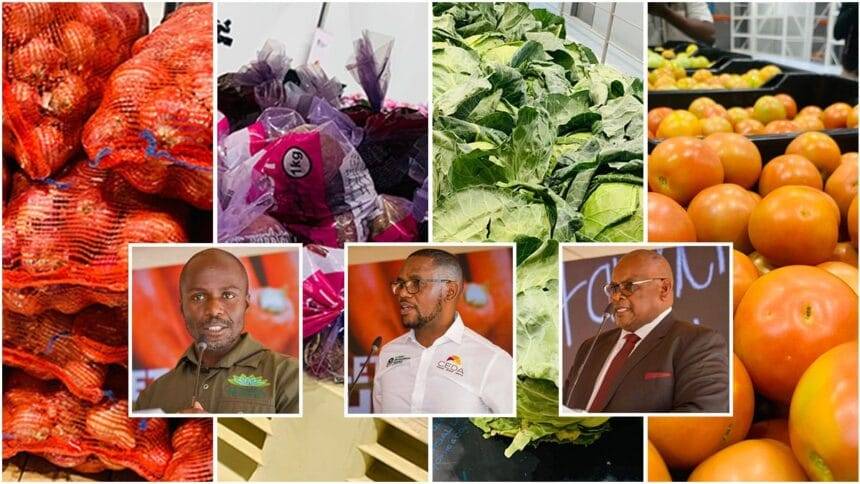Main Points In Hindi (मुख्य बातें – हिंदी में)
बागवानी उत्पादों के लिए स्थापित किए गए संग्रह केंद्र के मुख्य बिंदु:
-
बागवानी उत्पाद बाजार की स्थापना: सरकार ने स्थानीय उत्पादकों को ताजा उपज बेचने के लिए एक बागवानी उत्पाद बाजार स्थापित किया है, जिसका उद्देश्य स्थानीय स्तर पर उत्पादकों को जोड़ना है।
-
स्थिर आपूर्ति और मूल्य स्थिरता: बाजार का उद्देश्य बागवानी उत्पादन में निवेश पर रिटर्न बढ़ाना, सामंजस्यपूर्ण मापदंड के माध्यम से मूल्य स्थिरता सुनिश्चित करना और उत्पादक प्रतिस्पर्धा में सुधार करना है।
-
गुणवत्ता नियंत्रण: बाजार में उच्च गुणवत्ता वाले उत्पादों की सुनिश्चितता के लिए गुणवत्ता नियंत्रण के सख्त नियमों की आवश्यकता पर जोर दिया गया है, ताकि उपभोक्ताओं का भरोसा बढ़े।
-
किसानों के लिए लाभकारी: यह बाजार स्थानीय किसानों को अपने उत्पादों को प्रभावी ढंग से बेचने में मदद करेगा, जिससे उन्हें बेहतर लाभ होगा और उनकी चिंता कम होगी।
- आयात पर निर्भरता कम करना: बागवानी बाजार के माध्यम से स्थानीय उत्पादन को बढ़ावा देना, विशेषकर उन सब्जियों के लिए जिन पर आयात प्रतिबंध लागू हैं, जिससे स्थानीय बाजार में स्थिरता आएगी।
Main Points In English(मुख्य बातें – अंग्रेज़ी में)
Here are the main points from the text about the establishment of a horticultural market by the government:


-
Establishment of Horticultural Market: The government has set up a horticultural market in Block 3 Industrial, Gaborone, to serve as a centralized buying point for locally grown fresh produce, connecting producers across the country.
-
Objectives of the Market: The market aims to enhance returns on investments in horticulture, ensure price stability through a steady supply, improve producer competition, and increase civic participation in horticulture.
-
Quality Control and Safety Regulations: There is a call for strict quality control measures to ensure only high-quality products enter the market, with emphasis on monitoring chemical residues to protect yield integrity.
-
Support for Local Farmers: The market is expected to alleviate losses for farmers by providing a consistent platform for selling produce, minimizing waste, and helping them repay debts by offering payments within five days of delivery.
- Response to Import Restrictions: The establishment of the market comes at a crucial time when there are import restrictions on certain vegetables, aiming to foster local production and stabilize supply and pricing in the horticulture sector.
Complete News In Hindi(पूरी खबर – हिंदी में)
सरकार बागवानी उत्पादों के लिए संग्रह केंद्र स्थापित करती है
सरकार ने स्थानीय उत्पादकों के लिए ताजा उपज बेचने के लिए एक बागवानी उत्पाद बाजार की स्थापना की है।
ब्लॉक 3 इंडस्ट्रियल, गेबोरोन में लेटसेमा हॉर्टिकल्चर मार्केट एक एकीकृत, बहुआयामी बागवानी बाजार केंद्र है, जो देश भर के उत्पादकों को जोड़ता है, जो स्थानीय रूप से उगाए गए ताजा उपज के लिए एक केंद्रीकृत खरीद बिंदु के रूप में कार्य करता है।
बाजार का लक्ष्य बागवानी उत्पादन निवेश में निवेश पर रिटर्न बढ़ाना, स्थिर आपूर्ति और निष्पक्ष तंत्र के माध्यम से मूल्य स्थिरता सुनिश्चित करना, उत्पादक प्रतिस्पर्धा में सुधार करना और बागवानी में नागरिक भागीदारी को व्यापक बनाना है।
नागरिक उद्यमिता विकास प्राधिकरण (सीईडीए) के संयोजन में उद्यमिता मंत्रालय द्वारा प्रशासित, बोत्सवाना बागवानी परिषद इस बाजार की स्थापना का आह्वान कर रही है क्योंकि उनका मानना है कि उपज की लगातार आपूर्ति बनाए रखने का यही एकमात्र तरीका है, खासकर आयात के इस समय के दौरान कुछ सब्जियों पर लगाए गए प्रतिबंध.
बोहोको के अध्यक्ष मोगोमोत्सी मोत्सवी के अनुसार, बाजार को गुणवत्ता नियंत्रण में सख्त होने की आवश्यकता है ताकि यह सुनिश्चित किया जा सके कि केवल उच्चतम गुणवत्ता वाले उत्पाद ही बाजार में आएं।
“इससे स्थानीय उपज पर ग्राहकों का विश्वास लाने में मदद मिलेगी। सरकार को बागवानी उपज पर रासायनिक अवशेष नियंत्रण पर अधिक सख्त होना चाहिए, जिससे उपज की अखंडता की रक्षा होगी। इसके अलावा बाज़ार कीट और बीमारियों को नियंत्रित करने और धीरे-धीरे उपज को बाज़ार में जारी करने का एक साधन है,” मोआत्सवी ने सरकार से कुछ बागवानी उपज के आयात पर रोक लगाने की मांग करते हुए कहा कि यह स्थानीय क्षेत्र को विकसित करने के लिए आवश्यक एक साहसिक राजनीतिक निर्णय था।
गैबोरोन से शुरुआत करने के बाद, इरादा उन क्षेत्रों में किसानों की सेवा के लिए देश भर में मौन, घनजी और फ्रांसिस्टाउन जैसे रणनीतिक स्थानों में अधिक संग्रह केंद्र खोलने का है।
अपनी ओर से, उद्यमिता मंत्री, कराबो गारे ने कहा कि बाजार की स्थापना बागवानी के लिए एक बड़ा कदम है, विशेष रूप से मूल्य श्रृंखला विकास में जो आयात पर भरोसा नहीं कर सकता है।
“बागवानी क्षेत्र अर्थव्यवस्था के लिए महत्वपूर्ण है क्योंकि इसमें नागरिकों के लिए रोजगार पैदा करने की क्षमता है। आइए हम छोटे और वाणिज्यिक किसानों को अधिक उत्पादन करने के लिए योगदान दें और प्रेरित करें। प्रारंभ में किसानों को अपनी उपज इधर-उधर बेचने के लिए मजबूर होना पड़ता था, जिसमें उनका समय लगता था, और कुछ दिनों के बाद उपज नष्ट हो जाती थी, जिससे उन्हें घाटे में बेचने के लिए मजबूर होना पड़ता था और फसल के बाद नुकसान उठाना पड़ता था। इसलिए यह बाजार उन्हें ताजा रहते हुए भी उनकी उपज का मूल्य देगा, ”गारे ने इस बात पर प्रकाश डाला कि बागवानी क्षेत्र रिटर्न प्राप्त करने में सबसे अधिक चुनौतीपूर्ण है।
“यह इस तथ्य के कारण है कि बागवानी बाजार किसानों के लिए अपने ऋण चुकाने के लिए लाभदायक नहीं रहा है, और बागवानी बाजार पर लाखों बकाया हैं, इसलिए उम्मीद है कि यह बाजार उन्हें अपने ऋण चुकाने में मदद करेगा,” लेत्सेमा बागवानी का संकेत देते हुए गारे ने कहा बाज़ार किसानों को मानसिक शांति देगा क्योंकि अब उन्हें बाज़ार के बारे में कम चिंता होगी, जिससे वे अधिक उत्पादन पर अपनी ऊर्जा खर्च करने से मुक्त होंगे।
बाजार के स्पष्ट उद्देश्य हैं जैसे स्थानीय स्तर पर मूल्य श्रृंखला विकास को बढ़ावा देने के लिए आयात को कम करना और साथ ही एक स्थिर बाजार प्रदान करने के अलावा छोटे किसानों के उत्थान में मदद करना।
क्षेत्र में स्थिरता को बढ़ावा देने के लिए, किसानों को उनकी उपज पहुंचाने के दिन से पांच दिनों के भीतर भुगतान किया जाएगा।
सीईडीए बोर्ड के अध्यक्ष, डॉ. अल्फ्रेड त्सेबोएंग ने कहा, “लेट्सेमा बागवानी बाजार ने सहयोग की भावना को मूर्त रूप दिया है, इसलिए यह अपने लाभ के लिए बागवानी किसानों के बीच संबंधों को मजबूत करने में मदद करेगा।
यह बाज़ार किसानों के लिए एक केंद्र भी होगा और इस क्षेत्र को बनाए रखने में मदद करेगा।
बागवानी बाजार ऐसे समय में आया है जब स्थानीय लोग टमाटर, प्याज, आलू और हरी मिर्च जैसे उत्पादों की कमी से जूझ रहे हैं क्योंकि उन सब्जियों पर आयात प्रतिबंध और अन्य की लंबी सूची 2025 तक जारी रहेगी।
उम्मीद यह है कि जैसे-जैसे स्थानीय उत्पादन बढ़ेगा, लेटसेमा बाजार आपूर्ति और मूल्य निर्धारण में स्थिरता प्रदान कर सकता है क्योंकि उत्पादन पर उचित डेटा उपलब्ध होगा और इससे बाजार में एक उत्पाद की अधिक आपूर्ति कम हो जाएगी।
Complete News In English(पूरी खबर – अंग्रेज़ी में)
Government Establishes Collection Center for Horticultural Products
The government has set up a horticultural market to help local producers sell their fresh produce.
The Letsema Horticulture Market, located in Block 3 Industrial, Gaborone, serves as a comprehensive and multi-functional market center connecting producers from across the country. It acts as a centralized purchasing point for locally grown fresh produce.
The market aims to enhance the return on investment in horticultural production, ensure price stability through a stable supply and fair mechanisms, improve producer competitiveness, and broaden citizen participation in horticulture.
The market is being established with the support of the Citizen Entrepreneurship Development Agency (CEDA) and the Ministry of Entrepreneurship, as the Botswana Horticulture Council believes that maintaining a consistent supply of produce is crucial, especially given the current restrictions on certain vegetables due to imports.
According to Bohoko’s President Mogomotsi Motsepe, the market needs to enforce strict quality control to ensure only the highest quality products are available. “This will help build customer trust in local produce. The government should be stricter about chemical residue control on horticultural products to protect the integrity of the produce. The market will also help control pests and diseases while gradually releasing produce for sale,” Motsepe stated, urging the government to impose a ban on some horticultural imports, viewing it as a bold political decision necessary for local development.
Starting in Gaborone, there are plans to open more collection centers in strategic locations throughout the country, including Maun, Ghanzi, and Francistown, to serve farmers.
Entrepreneurship Minister Karabo Gare noted that establishing this market represents a significant step for horticulture, especially in developing a value chain that doesn’t rely on imports. “The horticultural sector is vital to the economy as it has the potential to create jobs for citizens. Let’s encourage and motivate small and commercial farmers to produce more. Initially, farmers had to sell their produce in different places, wasting time, and some of their produce went bad after a few days, forcing them to sell at a loss. This market will give their produce value while keeping it fresh,” Gare emphasized, pointing out that horticulture is one of the most challenging sectors for obtaining returns.
“This is due to the fact that the horticultural market has not been profitable for farmers to repay their loans; there are millions owed in the horticultural market. Thus, this market is hoped to assist them in repaying their debts,” Gare added, indicating that Letsama Market will provide farmers peace of mind, allowing them to focus more on increasing production.
The market has clear objectives, such as reducing imports and providing a stable market while helping uplift small farmers and promoting local value chain development.
To promote stability in the sector, farmers will be paid within five days of delivering their produce.
CEDA Board Chairman Dr. Alfred Tseboeng stated, “The Letsama Horticulture Market embodies a spirit of collaboration and will help strengthen relationships among horticultural farmers for their benefit.”
This market will also serve as a hub for farmers and aid in sustaining the sector.
The horticultural market arrives at a time when local residents are facing shortages of products like tomatoes, onions, potatoes, and green chilies due to import restrictions, which will continue until 2025.
The hope is that as local production increases, the Letsama market will provide stability in supply and pricing due to improved data on production and a higher availability of products in the market.






